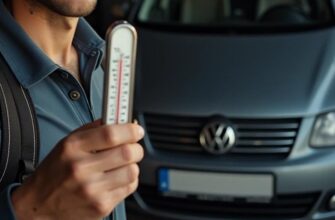Few things are as frustrating as pressing the accelerator pedal in your VW Polo, expecting that zip you know it has, only for it to feel sluggish, hesitant, or just plain weak. Losing power when accelerating isn’t just annoying; it can sometimes be a sign that your engine isn’t running as efficiently or healthily as it should be.
If your VW Polo feels like it’s running out of breath when you try to speed up, you’re not alone. This is a relatively common issue across many car models, and the good news is that the cause isn’t always something catastrophic.
Let’s dive into the common culprits behind power loss in your VW Polo and how you can start figuring out what’s going on.
Understanding Power Loss: The Engine’s Recipe for Oomph!
To understand why your Polo might be losing power, think about what a gasoline engine needs to generate force (power):
- Air: A sufficient amount of clean air needs to get into the engine.
- Fuel: The right amount of fuel needs to be delivered and mixed with that air.
- Spark: A strong spark is needed at the right time to ignite the air/fuel mixture.
- Compression: The engine cylinders must be able to compress this mixture effectively.
- Exhaust: The burned gases (exhaust) need to be able to exit the engine freely.
If there’s a problem with any of these ingredients or processes, your engine won’t be able to make its full power, and you’ll feel that loss of acceleration.
Common Causes: Why Your VW Polo Might Be Losing Power
Let’s look at the typical culprits that can steal your Polo’s acceleration power.
1. Fuel Delivery Issues (Is It Getting Enough Gas?)
The engine needs a steady, sufficient supply of fuel, especially when you ask for more power during acceleration.
- Clogged Fuel Filter: Over time, the fuel filter can get clogged with dirt and debris, restricting fuel flow to the engine. This is most noticeable when the engine demands more fuel – like when accelerating.
- Weak Fuel Pump: The fuel pump in the tank pushes fuel to the engine at a specific pressure. If the pump is weakening, it might not be able to keep up with demand during acceleration, causing the engine to starve for fuel.
- Clogged Fuel Injectors: The injectors spray fuel into the cylinders. If they’re dirty or clogged, they might not spray enough fuel or spray it inefficiently, especially at higher engine loads.
2. Air Intake & Exhaust Problems (Can It Breathe & Exhale?)
The engine needs to inhale plenty of clean air and exhale exhaust gases without restriction.
- Clogged Air Filter: A dirty air filter is like trying to run with a cloth over your mouth – it restricts airflow, reducing the air available for combustion. This is one of the easiest things to check!
- Mass Airflow Sensor (MAF) Fault: The MAF sensor measures how much air is entering the engine. If it’s dirty or faulty, it sends incorrect data to the engine computer, leading to the wrong amount of fuel being injected and reduced power.
- Boost Leaks (Turbocharged Polos): Many modern Polos have turbocharged engines. The turbo forces extra air into the engine (boost). If there are leaks in the intake hoses, intercooler, or connections after the turbo, you lose boost pressure, resulting in significant power loss when the turbo should be kicking in.
- Clogged Catalytic Converter: The catalytic converter cleans up exhaust gases. If it becomes clogged (often due to burning oil, coolant, or rich fuel mixtures), it creates a major restriction in the exhaust system, choking the engine. This leads to severe power loss, especially at higher RPMs. A common code for this is P0420. We have a guide on Diagnosing and Fixing the P0420 Catalytic Converter Efficiency Code if you suspect this might be your issue.
- Clogged EGR Valve: The Exhaust Gas Recirculation (EGR) valve recirculates some exhaust gases back into the intake to reduce emissions. If it gets stuck open or clogged, it can disrupt the air/fuel mixture, leading to poor performance, especially at idle or low acceleration.
3. Ignition System Problems (Is the Spark Strong?)
Without a strong, properly timed spark, the fuel-air mixture won’t ignite correctly.
- Worn Spark Plugs: Spark plugs wear out over time. Fouled, damaged, or worn plugs produce a weak spark or no spark, leading to misfires and a noticeable loss of power, often felt as stumbling or hesitation during acceleration.
- Faulty Ignition Coils: Each spark plug often has its own ignition coil. If a coil fails, that cylinder won’t fire at all, causing a significant misfire and power loss, usually accompanied by a flashing check engine light and rough engine shaking. Our guide on Engine Check Light Flashing and Car Shaking covers these symptoms.
“My 1.2 TSI Polo felt gutless when trying to accelerate on the motorway. No engine light, just slow. Mechanic found a small boost leak from a cracked hose near the turbo. Fixed that, and the power was back!” – Adam C., Polo Owner
4. Sensor Failures (Is the Engine Computer Getting Accurate Info?)
Modern engines rely on various sensors to tell the computer how much air, fuel, etc., is needed. If a sensor is bad, the computer operates on faulty data.
- Oxygen Sensors (O2): These sensors monitor the exhaust gases to see if the engine is running rich or lean. If an O2 sensor fails, the computer might use a default setting that isn’t optimal for performance, causing power loss and potentially a check engine light. Running too lean can cause codes like P0171; learn more in our article How to Fix the P0171 Lean Code on Your Vehicle.
- Boost Pressure Sensor: On turbocharged Polos, this sensor tells the computer the boost level. A faulty sensor means the computer doesn’t know the actual boost, limiting engine power.
5. Vacuum Leaks
Vacuum leaks allow “unmetered” air (air not measured by the MAF sensor) to enter the intake system. This throws off the air/fuel mixture, leading to rough idle, poor performance, and sometimes power loss, especially under load.
6. Carbon Buildup (Direct Injection Engines)
Many modern VW engines, including those in the Polo, use direct injection. A common issue with direct injection is carbon buildup on the intake valves over time, as fuel isn’t sprayed onto the valves to clean them. Severe carbon buildup restricts airflow into the cylinders, causing reduced power and efficiency.
What VW Polo Owners & Mechanics Say
Hearing from others who have faced this can highlight just how varied the causes can be!
“My Polo was fine around town, but on acceleration or going uphill, it just died. Turned out the catalytic converter was starting to clog up. Replaced it, and it pulls strong again.” – Ben S., Fixed the Exhaust
“Had a random power loss issue on my Polo 1.4. No check engine light initially, but felt like it hit a wall around 3000 RPM. Mechanic finally found a vacuum leak on a brittle hose that was only opening up under load.” – Chloe P., Traced the Leak

Troubleshooting Steps & What You Can Check First
Before you take your Polo in for service, here are a few things you can check or consider:
1. Look for Warning Lights!
The most important first step! Is the Check Engine Light on (solid or flashing)? Are there other lights like EPC? A warning light is your car’s way of telling you it detected a specific problem.
2. Get Diagnostic Codes Read
If the Check Engine light is on, get the codes read! Auto parts stores often do this for free, or you can use your own OBD-II scanner. The code (like P0300 for misfire, P0171 for lean, P0420 for catalytic converter) is the biggest clue to what system is having trouble.
3. Listen to the Engine & Feel the Car
Does the engine sound different when you accelerate? Is it running rough, misfiring, or shaking? Strange noises or vibrations can help narrow down the problem.
4. Check Your Air Filter
Open the airbox (check your manual) and visually inspect the air filter. If it’s black, clogged with debris, or looks very dirty, replace it. It’s cheap and easy!
5. Basic Visual Inspection Under the Hood
Look for anything obviously disconnected, cracked hoses (especially in the intake/turbo area for TSI models), or damaged wiring.
When to Seek Professional Help
While basic checks and getting codes read are great first steps, diagnosing power loss can be complex and often requires a mechanic.
- If the Check Engine light is on.
- If the engine is misfiring, shaking violently, or making unusual noises.
- If basic checks (air filter, visual) don’t reveal anything obvious.
- If you suspect issues with fuel pressure, turbo, catalytic converter, or internal engine components.
- If you don’t have access to a code reader or are uncomfortable performing inspections.
A qualified mechanic has the tools (advanced scanners, fuel pressure testers, smoke machines for vacuum leaks) and expertise to accurately diagnose the root cause of the power loss.
For further reading on related issues, check out authoritative automotive resources like Haynes manuals for specific Polo models, or reputable VW owner forums online. (Mentioning types of external resources).
Frequently Asked Questions (FAQ)
Q: Can a dirty air filter cause significant power loss when accelerating?
A: Yes, absolutely. A severely clogged air filter restricts the amount of air reaching the engine, which is crucial for combustion, leading to a noticeable loss of power, especially during acceleration when the engine needs the most air.
Q: How do I know if my catalytic converter is clogged?
A: Symptoms include significant power loss (worse at higher speeds/RPMs), a rotten egg smell (sulfur), excessive heat from the exhaust system, and often a P0420 check engine code.
Q: Can old spark plugs cause acceleration problems?
A: Yes. Worn or fouled spark plugs can cause misfires, leading to hesitation, stumbling, rough running, and reduced power output, most noticeable under acceleration load.
Q: Is losing power when accelerating dangerous?
A: It can be. Reduced power limits your ability to merge into traffic, pass other vehicles, or accelerate to avoid hazards, which can increase the risk of an accident. It’s best to get it diagnosed and fixed promptly.
Q: Does a boost leak always trigger a check engine light?
A: Not always immediately, especially if it’s a small leak. However, significant boost leaks that cause the engine to run too lean or the turbo to not reach target boost will typically eventually trigger a check engine light and related fault codes.
Conclusion
Experiencing power loss when accelerating in your VW Polo is a clear sign that your engine isn’t performing optimally. The causes can range from simple, inexpensive fixes like a clogged air filter to more complex issues like a failing fuel pump, turbo problem, or clogged catalytic converter. The most important first step is to check for any warning lights and get any diagnostic trouble codes read. While you can perform some basic visual checks yourself, accurately diagnosing the root cause often requires professional expertise. Don’t let your Polo feel sluggish – get to the bottom of the power loss to enjoy confident acceleration again!








